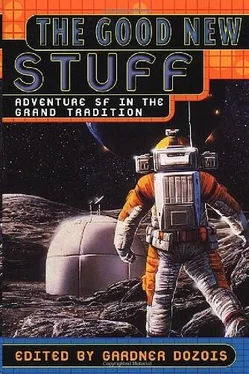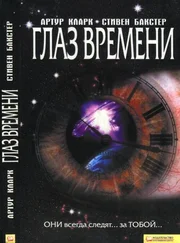Стивен Бакстер - The Good New Stuff
Здесь есть возможность читать онлайн «Стивен Бакстер - The Good New Stuff» весь текст электронной книги совершенно бесплатно (целиком полную версию без сокращений). В некоторых случаях можно слушать аудио, скачать через торрент в формате fb2 и присутствует краткое содержание. Год выпуска: 2002, ISBN: 2002, Издательство: St. Martin's Griffin, Жанр: Фантастика и фэнтези, на английском языке. Описание произведения, (предисловие) а так же отзывы посетителей доступны на портале библиотеки ЛибКат.
- Название:The Good New Stuff
- Автор:
- Издательство:St. Martin's Griffin
- Жанр:
- Год:2002
- ISBN:0-312-26456-9
- Рейтинг книги:3 / 5. Голосов: 1
-
Избранное:Добавить в избранное
- Отзывы:
-
Ваша оценка:
- 60
- 1
- 2
- 3
- 4
- 5
The Good New Stuff: краткое содержание, описание и аннотация
Предлагаем к чтению аннотацию, описание, краткое содержание или предисловие (зависит от того, что написал сам автор книги «The Good New Stuff»). Если вы не нашли необходимую информацию о книге — напишите в комментариях, мы постараемся отыскать её.
The Good New Stuff — читать онлайн бесплатно полную книгу (весь текст) целиком
Ниже представлен текст книги, разбитый по страницам. Система сохранения места последней прочитанной страницы, позволяет с удобством читать онлайн бесплатно книгу «The Good New Stuff», без необходимости каждый раз заново искать на чём Вы остановились. Поставьте закладку, и сможете в любой момент перейти на страницу, на которой закончили чтение.
Интервал:
Закладка:
At this point, as if aware of observation, the craft's blast vanished from the screen.
The Watch Officer was intrigued but not much concerned; his probe had it on firm trace and would not let go. He notified HQ Mars, which was providentially the nearest HQ to him, of an incoming "artificial object of unknown origin," accompanied by a full transcript of the Mate's data, stated: "Intelligence probe despatched" and sat back to contemplate the probable uproar at HQ Mars. The lunatic fringe would be in full babble.
The computer, not Fernix, had cut the pod's blast because its velocity had dropped to the effective rate for rounding the system's sun. There would be corrections later as approach allowed more accurate data on the star's mass and gravity but for two million kilometers the pod would coast.
Fernix drifted into sleep. Transformation sleep conferred no healing, being essentially a reduction of metabolism to preservative zero; nothing was lost or gained during the hiatus. So he had awakened still in reaction to the stress of escape from Deadly Thorn and now needed sleep.
He woke again to the stridency of an alarm. The computer flashed characters in urgent orange, proclaiming the presence of a mass in steady attendance above and to the right of the pod and no more than twice its length distant.
He realized sluggishly that the mass must be a ship; only a ship equipped with damping screens could have approached so closely without detection.
The thought brought him fully alert. He opened a narrow vision slit and at first saw nothing; then he observed the slender occulting of stars. The thing was in darkness and probably painted black, else the central sun should have glinted on its nose.
If this was an artifact of the local life, he needed to find out what he could about it, even at the risk of exposing himself— if that was indeed a risk. The crew might well be friendly. He primed a camera for minimum exposure and, to aid it, turned the pod's lighting up full and opened the vision slit to his head's width for a tenth of a second.
It was enough for the camera to take its picture. It was enough, also, for the other to shoot through the gap a beam of intense light to take its own picture and blind Fernix's weak eyes. He flung his arms across his face and grunted with pain until his sight cleared. He stayed in darkness with the slit closed. He reasoned that he had been photographed by a race whose vision stretched farther into the shortwave light spectrum than his and not so far into the gentler infrared.
When the ache in his eyes subsided he examined his own infra-red picture. It showed a slender needle of nondescript color, dull and non-reflective, without visible ports. The small diameter of the craft inclined him to think it was an unmanned reconnaissance probe. His evolutionary teaching dictated that an intelligent life form must perforce have its brain case and sensory organs raised well above ground level, and no such entity could have stood upright or even sat comfortably in that projectile.
He considered what action he might take.
He had been outplayed at the observation game and could do nothing about that. His weaponless pod was not equipped to fight, which was perhaps as well; nothing would be gained by antagonizing these unknown people. Evasive action was out of the question. His fuel supply was low and his computer's decisions had been made on limits too tight for any but last-ditch interference from himself; there was none for ad hoc maneuver.
He could take no action. The next move must come from outside.
Conclusion reached, he slept.
The Search and Rescue call sign squealed in the shack, the screen cleared and Takamarra looked up from his novel as the Watch Officer hailed him, "John, oh John, have we got something here! This one will puncture holes in your Dreaming!"
John said coldly, "Indeed." He was no traditionalist but did not appreciate light handling of his cultural mores by a white man.
Some fifteen seconds would pass before his reply reached S & R and fifteen more for the Watch Officer's response. In that time he digested the message and concluded that the unlikely was true, that the intruding craft was extra-systemic. Alien. And that the existence of life among the stars could have some effect on the credibility of Murri Dreaming.
Then he decided that it would not. Incursion of the white man and knowledge of a huge world beyond the oceans had altered most things in his people's lives but not that one thing, the Dreamings around which the Murri cultures were built. Science and civilization might rock on their foundations as the word went out, We are not alone, but the ancient beliefs would not shift by the quiver of a thought.
Willy Grant's voice said, "Get this carefully, John. Make notes. We need the biggest scow you've got because yours is the nearest mining group. We want to pick this little ship out of the sky but we can't get a magnetic grapple on it because what little metal there is appears to be shielded. The best bet is to clamp it in the loading jaws of your Number Three scow if it's available. The thing is only ten meters long and three wide, so it will fit in easily. The scow can dawdle sunwards and let the outsider catch up with it until they are matched for speed. Forty-eight hours at one point five-g should do it. This is an Emergency Order, John, so time and fuel compensation will be paid. Relay that to your Manager, but pronto. The scow's computer can talk to mine about course and speed and we'll have your Manager's balls in a double reef knot if he raises objections. Got it?"
"Got it, Willy." He repeated the message for check. "Hang on while I pass it." Minus the threat; the Elder might not appreciate blunt humor.
The Murri Duty Manager preserved the Old Man routine of unimpressed self-possession, which fooled nobody. He turned his eyes from his screen, contemplated infinity in his fingernails for a respectable sixty seconds, raised his white-bearded head with an air of responsible decision-making and said, "Number Three scow is empty and available. It shall be floated off. The S & R computer can then take over." He would not have had the nerve to say otherwise; nobody in space flouted S & R.
Grant, on the other screen, heard the message and beat down the temptation to wink at John; the tribal old dear would be outraged and so would his miners. The Murri were good blokes but in some areas you had to tread carefully. When the Manager had cut out, he said, "Now, John, this'll rock you from here to Uluru. Look!"
He displayed a picture of the intruder illuminated by the probe's beam. It was shaped roughly like an appleseed, symmetrical and smooth, its line broken only by what must be a surprisingly narrow jet throat. Its color seemed to be a deep brown, almost ebony.
"Now, get this!" He homed the viewpoint to a distance of a few inches from the hull. "What do you make of it?"
What John saw surprised him very much. The hull surface was grained like wood; there was even a spot where some missile (sand-grain meteoroid?) had gouged it to expose a slightly lighter color and what was surely a broken splinter end.
Willy carried on talking. You do not wait for an answer across a thirty-second delay. "Looks like wood, doesn't it? Well, see this!" The view roved back and forth from nose to tail, and the wave pattern of the grain flowed evenly along the whole length. "You'd think they grew the thing and lathed it out of a single block. And why not? A ship doesn't have to be built of steel, does it? I know timber couldn't stand the take-off and landing strains but how about if they are ferried up in bulk in a metal mother ship or built on asteroids and launched at low speed? Or there could be means of hardening and strengthening timber; we don't know because we've never needed to do it. But a race on a metal-poor world would develop alternative technologies. I'd stake a month's pay the thing's made of wood, John."
Читать дальшеИнтервал:
Закладка:
Похожие книги на «The Good New Stuff»
Представляем Вашему вниманию похожие книги на «The Good New Stuff» списком для выбора. Мы отобрали схожую по названию и смыслу литературу в надежде предоставить читателям больше вариантов отыскать новые, интересные, ещё непрочитанные произведения.
Обсуждение, отзывы о книге «The Good New Stuff» и просто собственные мнения читателей. Оставьте ваши комментарии, напишите, что Вы думаете о произведении, его смысле или главных героях. Укажите что конкретно понравилось, а что нет, и почему Вы так считаете.











